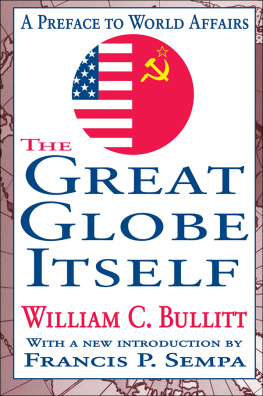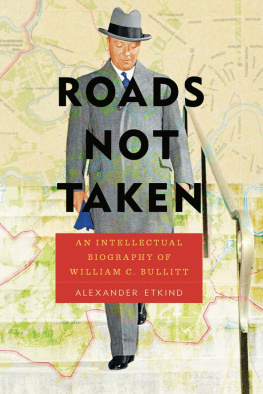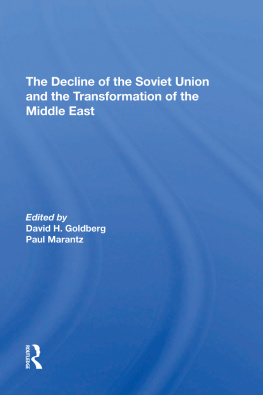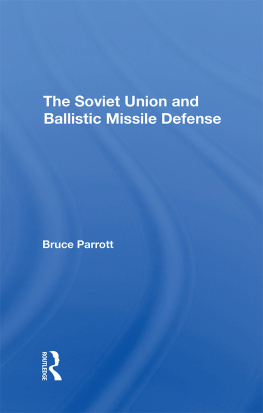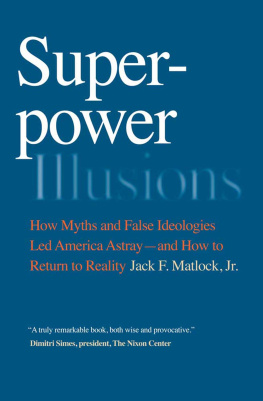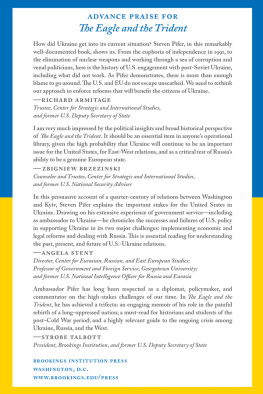Originally published in 1946 by Charles Scribners Sons.
Published in 2005 by Transaction Publishers
Published 2017 by Routledge
2 Park Square, Milton Park, Abingdon, Oxon 0X14 4RN
711 Third Avenue, New York, NY 10017, USA
Routledge is an imprint of the Taylor & Francis Group, an informa business
Copyright 2005 by Taylor & Francis.
Copyright 2003 by American Diplomacy Publishers.
All rights reserved. No part of this book may be reprinted or reproduced or utilised in any form or by any electronic, mechanical, or other means, now known or hereafter invented, including photocopying and recording, or in any information storage or retrieval system, without permission in writing from the publishers.
Notice:
Product or corporate names may be trademarks or registered trademarks, and are used only for identification and explanation without intent to infringe.
Library of Congress Catalog Number: 2005045977
Library of Congress Cataloging-in-Publication Data
Bullitt, William C. (William Christian), 1891-1967.
The great globe itself: a preface to world affairs / William C. Bullitt ; with a new introduction by Francis P. Sempa.
p. cm.
Originally published: New York : Charles Scribners Sons, 1946.
Includes bibliographical references and index.
ISBN 1-4128-0490-6 (alk. paper)
1. World War, 1939-1945Diplomatic history. 2. United States-Foreign relationsSoviet Union. 3. Soviet UnionForeign relationsUnited States. 4. World politics1933-1945. I. Sempa, Francis P. II. Title.
D753.B79 2005
327.7304709044dc22
2005045977
ISBN 13: 978-1-4128-0490-5 (pbk)
TRANSACTION INTRODUCTION
WILLIAM C. BULLITT: DIPLOMAT AND PROPHET
ON JANUARY 29, 1943, a trusted adviser and friend of President Franklin D. Roosevelt wrote a lengthy, confidential memorandum about Soviet intentions that could have changed the course of post-World War II history had it not been ignored by the president. William Christian Bullitt, the author of the memorandum, was at the time a roving ambassador for FDR formally assigned to the Navy Department. He previously had served with distinction as Americas first ambassador to the Soviet Union (1933-1936) and as ambassador to France (1936-1940). Bullitt followed up the January memorandum to FDR with two similar but shorter memoranda in May and August of 1943 that were likewise ignored by the president. FDR, as we know, believed that he understood and could handle Soviet dictator Josef Stalin better than Bullitt or any of his other advisers and allies (including Winston Churchill). Tragically, FDR was wrong. In one of the most momentous diplomatic failures of the twentieth century, FDR pursued policies, both military and political, during the Second World War that resulted in the replacement of the Nazi threat with an even greater and far more enduring Soviet geopolitical threat.
The British historian Paul Johnson has repeatedly reminded his readers that there are no inevitabilities in history. Soviet domination of Eastern and Central Europe and parts of East Asia was not a foregone conclusion in 1943. Military developments and political decisions would determine the structure of the postwar order. It mattered greatly where U.S. and British forces linked up with the Soviet army at wars end. Stalin understood this. Near the end of the war, the Soviet dictator commented to a Yugoslavian communist ally that a countrys social system would be imposed on all the lands conquered or occupied by the countrys armed forces. No one in the inner circles of the U.S. government understood or grasped that fact earlier than William Bullitt.
The failure of U.S. wartime diplomacy, the emergence of the Soviet geopolitical threat, and a proposal for a comprehensive Western strategy to counter that threat were the subjects of Bullitts early postwar classic, The Great Globe Itself.
William Bullitt was born in 1891 into a family that was considered part of Philadelphias aristocracy. His father, William C. Bullitt, Sr., was a successful lawyer, a state legislator, an executive of the Norfolk & Western Railroad, and the president of the Pocahontas Coal Company. His mother, Louisa, was the daughter of the successful streetcar company owner, Orville Horwitz. As a child, the future diplomat traveled to Europe each summer and became fluent in French and German. As a teenager, Bullitt attended a private boarding school in Philadelphia, and during the summers he stayed at an elite boys camp in New Hampshire called Camp Pasquaney. He graduated Phi Beta Kappa from Yale in 1912, where he excelled at foreign languages, debating, and drama. Bullitt started law school at Harvard, but dropped out soon after his fathers death in 1914.
In June 1914, shortly before the outbreak of the First World War, Bullitt accompanied his mother on a trip to Russia and Germany. When the war began, Bullitt and his mother left Germany for London where he unsuccessfully tried to become a war correspondent. Bullitt subsequently traveled to Paris in a successful effort to retrieve his grandmothers jewels, and while there, tried to enlist in the French army, but was rejected. He returned to Philadelphia and became a reporter for the Philadelphia Public Ledger.
When Bullitt returned to the United States he married Ernesta Bowen, the sister of Catherine Drinker Bowen (who later became a famous biographer). The couple honeymooned in war-torn Europe, staying mostly in Germany and Austria-Hungary, and Bullitt used the opportunity to continue writing about the war for the Public Ledger. Bullitt interviewed German and Austro-Hungarian government officials, diplomats, army officers, industrialists, and ordinary citizens.
Bullitts success as a war correspondent led to his appointment in late 1916 as the Washington bureau chief for the Public Ledger. In that role Bullitt developed sources and friendships with some of President Woodrow Wilsons most important advisers, including Edward House. Bullitt provided House with firsthand information about European affairs, and that, in turn, led to Bullitts appointment as an assistant secretary of state in December 1917.
It was while he was in the State Department that Bullitt began to advocate U.S. recognition of the new Bolshevik regime in Russia. He subsequently opposed the sending of American troops to Archangel and Murmansk during the Russian Civil War. The Wilson administration, however, refused to recognize Lenins government, and sent U.S. forces to Russia primarily to guard and reclaim war supplies that had been provided to Russias previous government. In a letter to Edward House, Bullitt warned that the U.S. was blunder[ing] blind [ly] to disaster in Russia, and proposed the creation in Washington of an organization competent to interpret Russia and the Revolution, staffed by men of deep wisdom and liberality.
When the war ended, the United States sent to Paris the American Commission to Negotiate Peace. The Commission consisted of President Wilson, Edward House, former ambassador to France, Henry White, and General Tasker Bliss. One of the Commissions staff members was William Bullitt. While in Paris, Bullitt floated the idea of sending an American delegation to Russia to meet with representatives of Lenins government to discuss possible diplomatic recognition. President Wilson approved the plan, but insisted that it must be done in secret. Bullitt was chosen to head the delegation.

